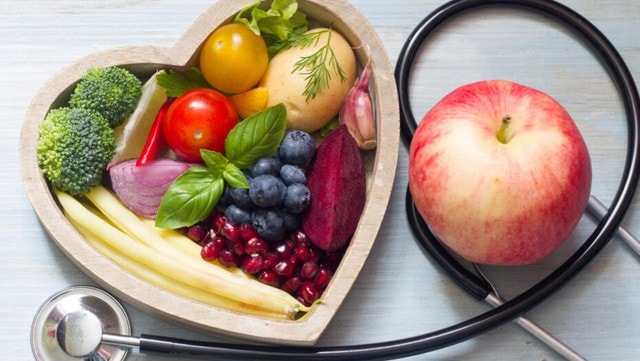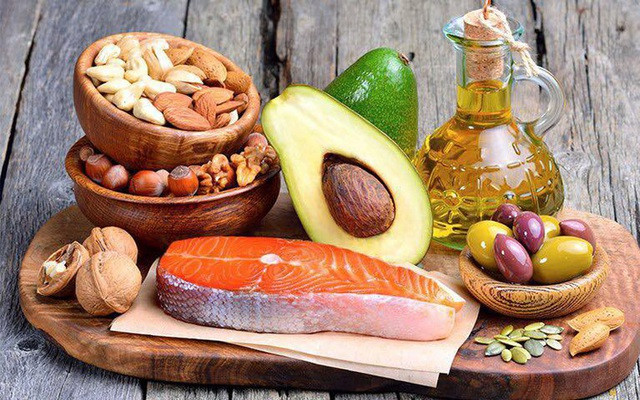9 notes on eating to control blood pressure, blood fat, and prevent cardiovascular disease
Eating a healthy diet with a variety of heart-healthy foods can help you prevent and control high blood pressure, high cholesterol, or heart failure.
1. Cardiovascular disease - the leading cause of death
Cardiovascular disease refers to a group of diseases related to blockage of blood flow affecting the circulation in the heart, brain, kidneys and legs. Some common cardiovascular diseases include: heart valve disease, myocardial infarction, atherosclerosis, stroke,...
Cardiovascular disease is a disease with silent symptoms so it is difficult to detect early but leaves many serious consequences for the patient. Cardiovascular disease is considered one of the diseases with the highest mortality rate.

According to annual reports, cardiovascular diseases are a real burden to society, the leading cause of death worldwide, including Vietnam. Worryingly, cardiovascular diseases can happen to anyone, at any age and tend to get younger and younger, causing many health impacts.
While some cardiovascular diseases can be prevented, young people do not know much about the risks of heart disease and often have a subjective mentality, so they do not take appropriate preventive measures. According to medical experts, most cardiovascular diseases can be treated to reduce the risk and severity by adjusting unhealthy lifestyles...
Associate Professor, Dr. Pham Manh Hung - Director of the Vietnam National Heart Institute, Vice President of the Vietnam Cardiology Association said: Most cardiovascular diseases today can be effectively prevented through adjusting unhealthy lifestyles such as quitting smoking, having a healthy diet, increasing physical exercise and not abusing alcohol.
2. A healthy diet is good for the heart
One of the most important things you can do to prevent heart disease is to start a healthy diet with heart-healthy foods. Changing your diet can also help reverse the symptoms of heart disease and prevent them from getting worse. Start with small changes and over time, making a few changes will form habits that will make a big difference in your heart health.
-Eat plenty of fruits, vegetables, whole grains, and other high-fiber foods:Eat a variety of fruits and vegetables every day. Dark green, deep orange, and yellow fruits and vegetables are especially nutritious. Examples include spinach, carrots, peaches, and berries.
Dr. Nguyen Trong Hung - Head of Adult Nutrition Examination and Consultation Department, National Institute of Nutrition:
The recommended intake of ripe fruits and vegetables is 500-600g/day. Note that you should eat fruits in segments or pieces to control the quantity. Do not drink too much fruit juice because it can easily cause excess energy.
-Eat a variety of grain products, should prioritize whole grain foods that are rich in fiber and nutrients. Whole grains include oats, whole wheat bread and brown rice...
-Limit salt (sodium). This is especially important for people at risk or who already have high blood pressure. Try to limit sodium intake to less than 2,300 mg (about 5.8 grams of salt) per day to help lower blood pressure. If you already have high blood pressure, limiting sodium to 1,500 mg per day will have even more heart benefits. Use herbs and spices, instead of salt, to add flavor to foods.
-Eat at least 2 portions of fish per week. Oily fish, which contain omega-3 fatty acids, are best for your heart. These fish include salmon, mackerel, herring, and sardines.
-Limit drinks and foods with refined sugars.
-Limit saturated fat, trans fat, and cholesterol:Trans fats are found in many foods made with hydrogenated or partially hydrogenated vegetable oils. These foods include cookies, crackers, potato chips, and many processed snack foods.
To limit saturated fat and cholesterol, try to choose the following foods: Lean meats and meat alternatives such as beans or tofu Fish, vegetables, beans, and nuts Fat-free and low-fat dairy products
-Choose polyunsaturated or monounsaturated fats, such as canola and olive oil, to replace saturated fats, such as butter. But keep in mind that all fats are high in calories, so watch your portions.

-Maintain a healthy weightby balancing your calorie intake with your daily physical activity. Eat only the calories you need to maintain a healthy weight. If you want to lose weight, increase your activity level to burn more calories than you eat.
-Quit drinking alcohol.If you still want to drink, do so in moderation and replacing hard liquor and beer with wine may be more beneficial for your heart. Limit alcohol to two drinks a day for men and one drink a day for women. You may get even more benefits from changing your diet if you exercise regularly and don't smoke./.


